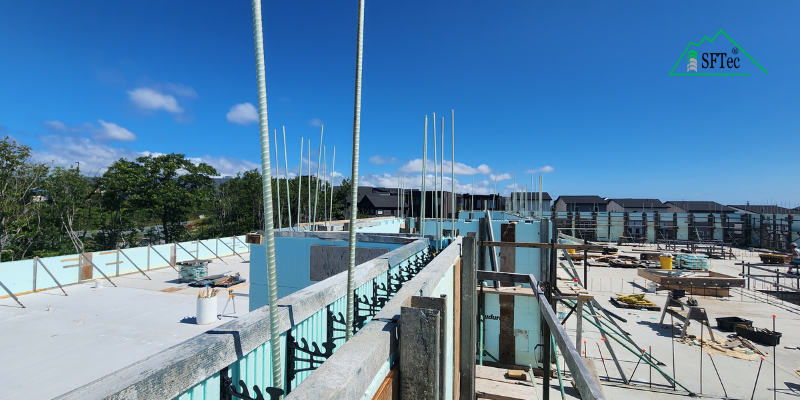Montreal, June 26th, 2024 – In the realm of construction, the pursuit of durable, eco-friendly, and cost-effective solutions remains a priority. In this pursuit, Insulated Concrete Forms (ICF) stand out as a revolutionary innovation, offering superior insulation and structural integrity. But what if we could enhance their strength further while maintaining sustainability? In fact, Fiber Reinforced Polymer (FRP) rebars, specifically crafted from fiberglass, present a compelling alternative to traditional steel reinforcement. Let’s delve into the transformative benefits of reinforcing ICF walls with FRP rebars, spotlighting the unparalleled advantages of fiberglass over steel.
More Strength
FRP rebars, with fiberglass as their core material, have revolutionized the reinforcement landscape by offering remarkable strength without the drawbacks of steel. Despite being significantly lighter than steel, fiberglass boasts impressive tensile strength, ensuring structural stability without adding unnecessary weight. This strength amplification not only fortifies ICF walls against external pressures and natural forces but also extends their lifespan, reducing the need for frequent maintenance and repairs.
Corrosion Resistance
One of the biggest setbacks of steel reinforcement is corrosion, which jeopardizes structural integrity over time. Unlike steel rebars, fiberglass is resistant to rust and corrosion, making it an ideal choice for reinforcing ICF walls in humid or corrosive environments. By eliminating the risk of corrosion-induced deterioration, FRP rebars ensure longevity and reliability, sparing property owners the expense and hassle of premature replacements or repairs.
Thermal Efficiency and Sustainability
Sustainability is imperative in modern construction practices, and fiberglass emerges as the best alternative in promoting eco-friendly solutions. In addition to its inherent durability, fiberglass exhibits superb thermal insulation properties, complementing the insulating capabilities of ICF walls. By reducing thermal conductivity and minimizing heat loss, FRP-reinforced ICF structures contribute to energy efficiency and environmental conservation. Furthermore, fiberglass production involves fewer environmental impacts compared to steel manufacturing processes, aligning with sustainable building practices and reducing carbon footprints.
In conclusion, the integration of FRP rebar, crafted from fiberglass, into ICF walls marks a shift in structural reinforcement methodologies. With its unparalleled strength, corrosion resistance, and sustainability, fiberglass applications can achieve unprecedented levels of resilience, longevity, and environmental responsibility. As the construction industry marches towards a greener, more resilient future, FRP-reinforced ICF walls stand as a testament to the transformative potential of fiberglass innovation.

